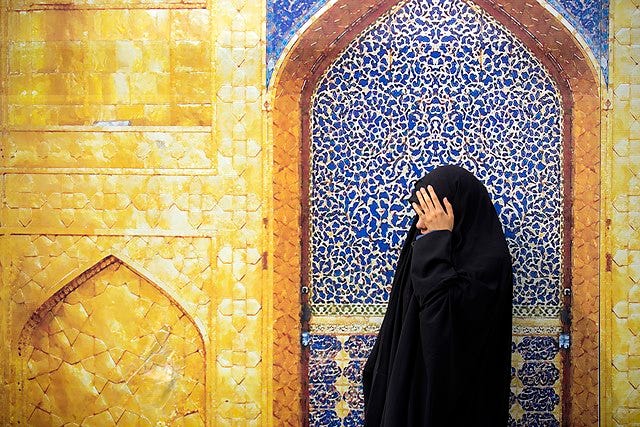Iran Launches Major Hijab Crackdown
Islamists will prosecute "without mercy" and levy "large fines."
The death of the young Kurdish woman Mahsa Amini by the Iranian religious police on September 22, 2022, began it all. After months of women burning their hijabs and flaunting laws it public—and protests so intense they threaten regime change—the Iranian government plans a vicious crackdown.
Proposed measures fine women $60,000 for “bad hijab. They would have their passport and drivers licenses confiscated and their mobile phone and Internet services blocked—and would use surveillance cameras to locate women for arrest who are badly veiled.
The feared Islamic Revolutionary Guards Corps (the IRGC) is patrolling the holy Shi'ite city of Qom during the fasting month of Ramadan to promote and enforce "the culture of hijab." As noted by Radio Free Europe:
Mohsen Araki, a member of the Assembly of Experts, the 88-member chamber of theologians that oversees the work of the country's supreme leader, compared uncovered women in Iran to a "new COVID" pandemic.
Beyond the threats to the safety of women—and the men who helped them protest—is that it indicates a government divided:
Ali Khomenei pardoned 22,000 protestors last month just before Ramadan. Pardons are customary this time of year, but given the violence of the crackdown on the last months, it was extraordinarily conciliatory. He also ordered the morality police off the streets.
The progressives and moderates in and around the Iranian government have carefully positioned themselves in the support of the protestors, but a real revolution cannot be by popular vote: in the last 25 years, the Khomenei government has stripped the rights to stand for office from tens of thousands of politicians. It has kept reformist Mohammad Khatami, the fifth president of Iran, under virtual house arrest since 2017.
The Conservative End Run
And the third group, the hyperconservatives in the Majlis, have now put in motion what looks like a conservative end run. Many observers believe Iran is headed for regime change, Reza Pahlavi is waiting in the wings, and international courts are drafting cases against Iran for crimes against humanity. Human rights think it’s possible there may be an Iranian Spring following the end of Ramadan on April 20th.


